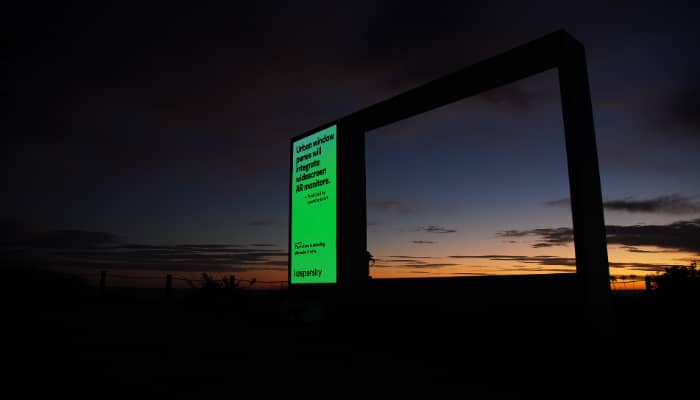Auckland, New Zealand – Global cybersecurity firm Kaspersky has partnered with global advertising agency BBDO in launching a live stream billboard in New Zealand as part of Kaspersky’s campaign ‘Safer Tomorrow’, aimed at trying to answer humankind’s questions about the foreseeable future.
The billboard, placed temporarily in Castlepoint Station on the Wairarapa coast of New Zealand, utilized BBDO’s developed foretelling neural network to answer to the most significant questions about ‘tomorrow’ – from “when will flying cars become ordinary vehicles?” to “what will 3D printing be capable of by 2050?” In addition, audiences are able to view the billboard live from New Zealand via the ‘Safer Tomorrow’ website.
“Kaspersky is committed to building a more protected and safer world. To achieve this, the global cybersecurity company closely follows technological trends and predictions to generate a picture of what we can expect in the future and to understand how to secure it in advance. Kaspersky also believes that the more people who consider the future and the likely trajectories of society and technology, the more they will be able to foresee and contribute to this better and safer tomorrow,” the company said in a press statement.

The deployed neural network uses the latest machine learning architecture and techniques and is trained to analyze requests and provide predictions based on data collected from hundreds of thousands of related sources, including science fiction books and magazines, selected media, and blogs.
Asked about the use of science fiction materials as a base for the ‘Safer Tomorrow’ predictions, the company stated that “boldest predictions were usually considered not just incredible but even whimsical at the time they were made.”
“Over the last few decades, as SciFi authors have got access to the latest progress in science, their ideas and predictions are treated with much more respect and seriousness even by scientists,” the company stated.
The company, however, clarified that the neural network itself will admit as to whether no answer can be provided, and will try its best to reformulate the question or prod for another one to be asked.
“Some predictions are still to be made, and even the neural network’s knowledge has its limits. But not knowing everything about the future makes it even more amazing and thrilling. Generating a specific prediction as an answer to a question would take a few seconds,” the company added.
Furthermore, insights used in the ‘Safer Tomorrow’ platform will be also using Kaspersky’s former interactive project ‘Earth 2050’, a platform project providing a futuristic image of what the world will look like in 30 years’ time.
The creation of the ‘Safer Tomorrow’ platform, according to Andrew Winton, vice president for global marketing at Kaspersky, was to raise people’s awareness about what the future might look like and feel more certain about upcoming opportunities.
“Looking into and understanding the future is something that has occupied the minds of humankind throughout time. It is this knowledge that allows us to be secure, prepared and confident. Kaspersky believes in a bright future where, [the] as-of-yet unseen potential for humanity will be opened up by technology, which is why we secure it,” Winton stated.
The live stream billboard construction will be accessible to the public until February 25 and will be dismantled thereafter.

